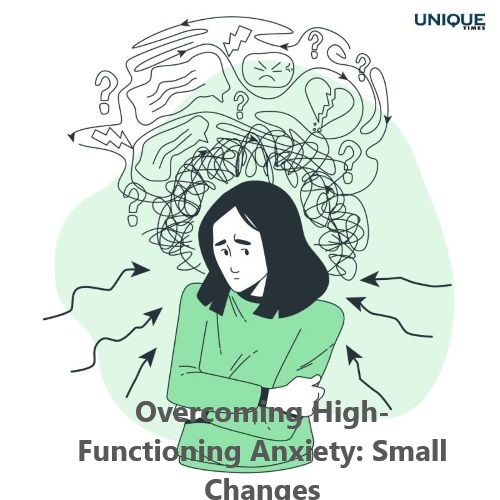Get Over High-Functioning Anxiety By Making These Small Changes

High-functioning anxiety can be a challenging and often unnoticed condition that affects many individuals. While those who experience it may appear composed and successful on the outside, they often battle with overwhelming anxiety on the inside. Coping with high-functioning anxiety requires self-awareness and a willingness to make positive changes. In this blog, we will explore some small yet impactful adjustments that can help individuals overcome high-functioning anxiety and improve their overall well-being.
- Prioritize Self-Care: Self-care is essential for everyone, but it’s particularly crucial for individuals dealing with high-functioning anxiety. Start by establishing a consistent sleep schedule, aiming for 7-9 hours of quality sleep each night. Incorporate relaxation techniques into your daily routine, such as meditation, deep breathing exercises, or yoga. Taking time to relax and recharge can significantly reduce anxiety levels and promote a sense of calm.
- Set Realistic Goals: People with high-functioning anxiety often place immense pressure on themselves to excel in every aspect of life. To combat this, learn to set realistic and achievable goals. Break bigger tasks into smaller, manageable steps, and celebrate your achievements along the way. Accept that perfection is unattainable and that making progress, no matter how small, is a valuable accomplishment.
- Practice Mindfulness: Mindfulness involves staying present in the moment and observing your thoughts and feelings without judgment. Engaging in mindfulness practices, such as mindful breathing or grounding exercises, can help redirect anxious thoughts and prevent them from spiraling out of control. Regular mindfulness practice can improve emotional regulation and foster a more balanced mindset.
- Limit Caffeine and Stimulants: Caffeine and other stimulants can exacerbate anxiety symptoms. While they may provide a temporary boost in energy and focus, they can also lead to increased restlessness and jitteriness. Consider reducing your caffeine intake or replacing it with herbal teas or decaffeinated options to support a calmer nervous system.
- Seek Support: Talking to someone about your high-functioning anxiety can be incredibly beneficial. Reach out to friends, family, or a mental health professional who can provide understanding and support. Sometimes, simply sharing your experiences and feelings with someone you trust can alleviate some of the burden.
- Practice Gratitude: Focusing on gratitude can shift your perspective and cultivate a more positive mindset. Regularly take time to reflect on the things you are grateful for, even the small ones. Keep a gratitude journal to jot down positive experiences, achievements, or acts of kindness that you’ve encountered each day.
- Establish Boundaries: Individuals with high-functioning anxiety often find it challenging to say no, leading to an overload of responsibilities and stress. Learning to set healthy boundaries is crucial for managing anxiety. Understand that it’s okay to decline additional tasks when your plate is already full. Prioritize your mental well-being and learn to say no without guilt.
Conclusion: Overcoming high-functioning anxiety is a journey that involves making small but impactful changes to your daily life. By prioritizing self-care, setting realistic goals, practicing mindfulness, limiting stimulants, seeking support, practicing gratitude, and establishing boundaries, you can gradually reduce anxiety’s grip on your life. Remember that progress may be gradual, but each step forward is a triumph worth celebrating. If your anxiety feels overwhelming or unmanageable, don’t hesitate to seek professional help from a mental health expert who can provide personalized guidance and support. You are not alone, and there is hope for a brighter, calmer future.








